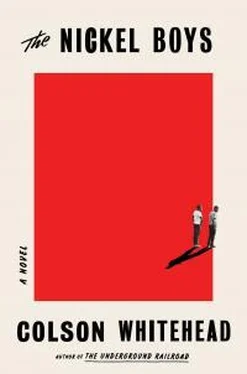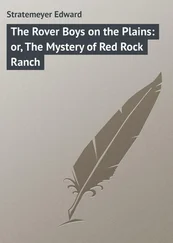Колсон Уайтхед - The Nickel Boys
Здесь есть возможность читать онлайн «Колсон Уайтхед - The Nickel Boys» весь текст электронной книги совершенно бесплатно (целиком полную версию без сокращений). В некоторых случаях можно слушать аудио, скачать через торрент в формате fb2 и присутствует краткое содержание. Год выпуска: 2019, Издательство: Penguin Random House LLC, Жанр: roman, на английском языке. Описание произведения, (предисловие) а так же отзывы посетителей доступны на портале библиотеки ЛибКат.
- Название:The Nickel Boys
- Автор:
- Издательство:Penguin Random House LLC
- Жанр:
- Год:2019
- ISBN:нет данных
- Рейтинг книги:4 / 5. Голосов: 1
-
Избранное:Добавить в избранное
- Отзывы:
-
Ваша оценка:
- 80
- 1
- 2
- 3
- 4
- 5
The Nickel Boys: краткое содержание, описание и аннотация
Предлагаем к чтению аннотацию, описание, краткое содержание или предисловие (зависит от того, что написал сам автор книги «The Nickel Boys»). Если вы не нашли необходимую информацию о книге — напишите в комментариях, мы постараемся отыскать её.
), that the world began to care.
The Nickel Boys — читать онлайн бесплатно полную книгу (весь текст) целиком
Ниже представлен текст книги, разбитый по страницам. Система сохранения места последней прочитанной страницы, позволяет с удобством читать онлайн бесплатно книгу «The Nickel Boys», без необходимости каждый раз заново искать на чём Вы остановились. Поставьте закладку, и сможете в любой момент перейти на страницу, на которой закончили чтение.
Интервал:
Закладка:
We must believe in our souls that we are somebody, that we are significant, that we are worthful, and we must walk the streets of life every day with this sense of dignity and this sense of somebody-ness. If he didn’t have that, what did he have? Next time, he would not falter.
The bleacher team headed back after lunch. Harper caught his arm. “Hold on a minute, Elwood.”
The other boys cut down the slope. “What is it, Mr. Harper?”
“I need you to head up to the farms and find Mr. Gladwell,” he said. Mr. Gladwell and his two assistants oversaw all the planting and harvesting at Nickel. Elwood had never talked to him, but everyone knew him from his straw hat and his farmer’s tan, which made him look like he swam across the Rio Grande to get here. “Those men from the state aren’t going to head up there today,” Harper said, “they’re going to send some other experts to check out the farms, special. You find him and tell him he can relax.”
Elwood turned to where Harper pointed, down the main road where the three inspectors mounted the steps to Cleveland. They went inside. Mr. Gladwell was God knows where up north, with the lime or potato fields, it was acres and acres. The inspectors would be gone by the time he got back.
“I’m liking the painting, Harper—can one of the little kids go?”
“Mr. Harper, sir. ” On campus they had to go by the rules.
“Sir, I’d rather work on the bleachers.”
Harper frowned. “Acting crazy today, all of you. You do what I asked you and on Friday it’s back to the usual.” Harper left Elwood on the dining-hall steps. Last Christmas, he’d stood in the same spot when Desmond told him and Turner about Earl’s stomach trouble.
“I’ll do it.”
It was Turner.
“What’s that?”
“That letter you got in your pocket,” Turner said. “I’ll get it to them, fuck it. Look at you—you look sick.”
Elwood searched for a tell. But Turner stood with the con men of the world and the con men never betray the game.
“I said I’ll do it, I’ll do it. You got someone else?”
Elwood gave it to him and ran north without a word.
It took Elwood an hour to find Mr. Gladwell, who sat in a big rattan chair at the edge of the sweet potato fields. The man stood and squinted at Elwood.
“Say what now? Guess I can smoke,” he said, and relit his cigar. He barked at his charges, who had stalled their labor at the sight of the messenger. “That doesn’t mean you can quit, now. Get to it!”
Elwood took the long way back, around the trails that circumnavigated Boot Hill and took him past the stables and laundry. He was slow with his steps. He didn’t want to know if Turner had been intercepted, or if the boy had ratted on him or simply taken his letter up to his hideout and put a match to it. Whatever waited for him on the other side would still be waiting for him whenever he got there, so he whistled a tune he remembered from when he was little, a blues tune. He didn’t recall the words or whether it had been his father or mother who sang it, but he felt good whenever the song snuck up on him, a kind of coolness like the shadow of a cloud out of nowhere, something that broke off something bigger. Yours briefly before it sailed on its way.
Turner brought him to his warehouse loft before supper. Turner had a license to roam, but Elwood didn’t, and he shook off a wave of fear. But if he wrote that letter, he was bold enough to enter the warehouse without permission. The hideout was smaller than in his imagination, a cramped recess Turner had chipped out of the Nickel cave—walls made of crates, a dingy army blanket, and a cushion from the rec-room couch. It was not the hideout of a canny operator but the slim refuge of a runaway who had stepped into a doorway to get out of the rain, collar hugged tight.
Turner sat against a box of machine oil and cradled his knees. “I did it,” he said. “I put it in a copy of The Gator. In the newspaper, like at the bowling alley when Mr. Garfield slipped a payoff to the fucking cops. Ran up to the man’s car and said, ‘I thought you’d like a copy.’ ”
“Which one did you give it to?”
“JFK, who else?” In disdain. “You think I gave it to that dude from The Honeymooners ?”
“Thanks,” Elwood said.
“I didn’t do shit, El. I delivered the mail, is all.” He put out his hand and the boys shook on it.
The kitchen staff brought out the ice cream again that night. The house fathers, and presumably Hardee, were satisfied with how the inspection had gone. At school the next day, and on Community Service that Friday, Elwood waited for the reaction, like he was back at Lincoln High School and waiting for the volcano to bubble and smoke in science class. The National Guard didn’t screech into the parking lot, Spencer didn’t put his cold hand on his neck and say, “Boy, we have a problem.” It didn’t happen like that.
It happened as it ever happened. At night, in the dormitories, flashlights crawling over his face when they took him to the White House.
CHAPTER FIFTEEN
She read about the restaurant in the Daily News and left the clipping by his side of the bed so he wouldn’t miss it. It had been a while since they’d had a night out together. Three months on, his secretary Yvette still left the office early to care for her mother, which had him playing catch-up at the end of every day. Her mother was senile, but they called it dementia now. As for Millie, it was almost March so the annual madness had descended, April 15 coming up and everybody scrambling. “They have a level of denial that is positively insane,” his wife said. She usually got home in time for the eleven o’clock news. He’d canceled date night twice already— date night was some women’s magazine thing now embedded in his vocabulary like a splinter—so Millie was not going to let him miss this one. “Dorothy has been twice and says it’s amazing,” Millie said.
Dorothy thought a lot of things were amazing, like gospel brunch, American Idol, and organizing a petition against that new mosque opening up. He held his tongue.
He left at seven, after taking a crack at decoding the new health plan Yvette had dug up for Ace. It was cheaper but was he getting ripped off in the long run with the co-pay bullshit? This species of paperwork had always confounded and vexed. He’d have Yvette explain it again when she got in the next day.
He got off at the City College stop on Broadway and peeled off up the hill. It was warmer than it was supposed to be for March, but he remembered more than one April blizzard in Manhattan and wasn’t ready to call it spring yet. “It happens right after you put your coat away,” he said. Millie told him he sounded like some batty hermit who lived in a cave.
Camille’s was on the corner of 141st and Amsterdam, the anchor retail of a seven-story tenement. The Daily News review described the place as nouveau Southern, “down-home plates with a twist.” What was the twist—that it was soul food made by white people? Chitlins with some pale pickled thing on top? A neon Lone Star beer sign blinked in the window and a halo of battered Alabama license plates surrounded the menu by the entrance. He squinted—his eyes weren’t what they used to be. Despite the hillbilly warning signs, the food sounded good and not too fussed over, and when he got to the hostess station, most of the patrons inside were neighborhood people. Black people, Latinos who probably worked in the area, for the college. Squares, but their presence vouched.
The hostess was a white girl in a light blue hippie dress, one of that clan. Chinese-character tattoos scrolled up her wiry arms, who knew what they said. She pretended not to see him and he started up a round of “Racism or Bad Service?” He didn’t get far into his calculations before she apologized for the wait—the new system was down, she said, frowning at the gray glow on her stand. “Would you like to sit now or wait for the rest of your party?”
Читать дальшеИнтервал:
Закладка:
Похожие книги на «The Nickel Boys»
Представляем Вашему вниманию похожие книги на «The Nickel Boys» списком для выбора. Мы отобрали схожую по названию и смыслу литературу в надежде предоставить читателям больше вариантов отыскать новые, интересные, ещё непрочитанные произведения.
Обсуждение, отзывы о книге «The Nickel Boys» и просто собственные мнения читателей. Оставьте ваши комментарии, напишите, что Вы думаете о произведении, его смысле или главных героях. Укажите что конкретно понравилось, а что нет, и почему Вы так считаете.

![Колсон Уайтхед - Подземная железная дорога [litres]](/books/411182/kolson-uajthed-podzemnaya-zheleznaya-doroga-litres-thumb.webp)










